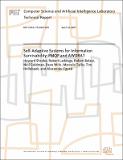| dc.contributor.advisor | Howard Shrobe | |
| dc.contributor.author | Shrobe, Howard | |
| dc.contributor.author | Laddaga, Robert | |
| dc.contributor.author | Balzer, Robert | |
| dc.contributor.author | Goldman, Neil | |
| dc.contributor.author | Wile, Dave | |
| dc.contributor.author | Tallis, Marcelo | |
| dc.contributor.author | Hollebeek, Tim | |
| dc.contributor.author | Egyed, Alexander | |
| dc.contributor.other | AIRE | |
| dc.date.accessioned | 2007-04-10T21:41:47Z | |
| dc.date.available | 2007-04-10T21:41:47Z | |
| dc.date.issued | 2007-04-10 | |
| dc.identifier.other | MIT-CSAIL-TR-2007-023 | |
| dc.identifier.uri | http://hdl.handle.net/1721.1/37151 | |
| dc.description.abstract | Information systems form the backbones of the critical infrastructures of modern societies. Unfortunately, these systems are highly vulnerable to attacks that can result in enormous damage. Furthermore, traditional approaches to information security have not provided all the protections necessary to defeat and recover from a concerted attack; in particular, they are largely irrelevant to the problem of defending against attacks launched by insiders.This paper describes two related systems PMOP and AWDRAT that were developed during the DARPA Self Regenerative Systems program. PMOP defends against insider attacks while AWDRAT is intended to detect compromises to software systems. Both rely on self-monitoring, diagnosis and self-adaptation. We describe both systems and show the results of experiments with each. | |
| dc.format.extent | 10 p. | |
| dc.relation.ispartofseries | Massachusetts Institute of Technology Computer Science and Artificial Intelligence Laboratory | |
| dc.subject | Information Survivability | |
| dc.subject | Model Based Diagnosis | |
| dc.subject | Adaptive Software | |
| dc.title | Self-Adaptive Systems for Information Survivability: PMOP and AWDRAT | |
